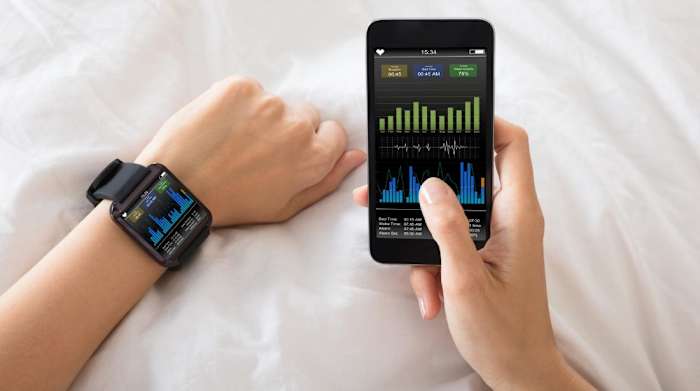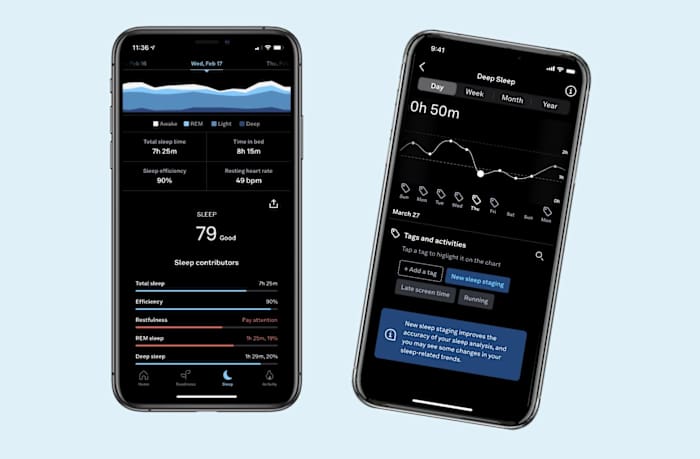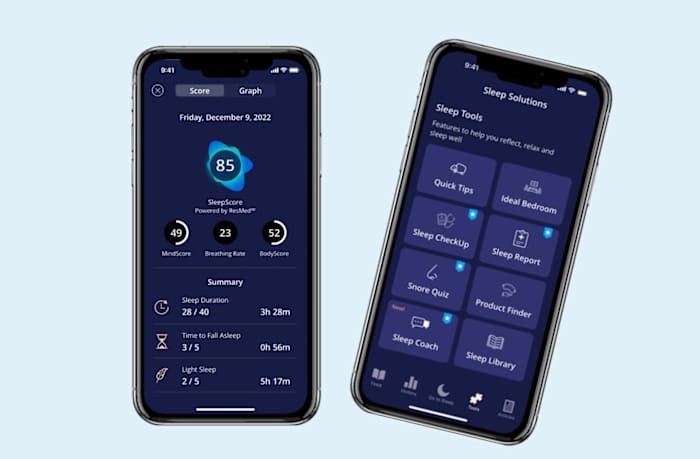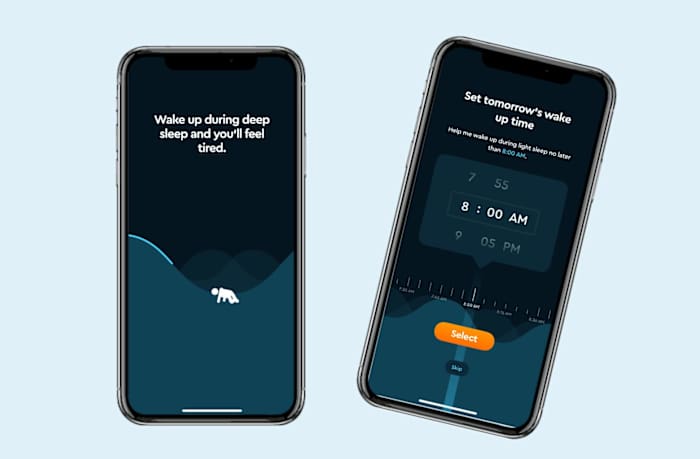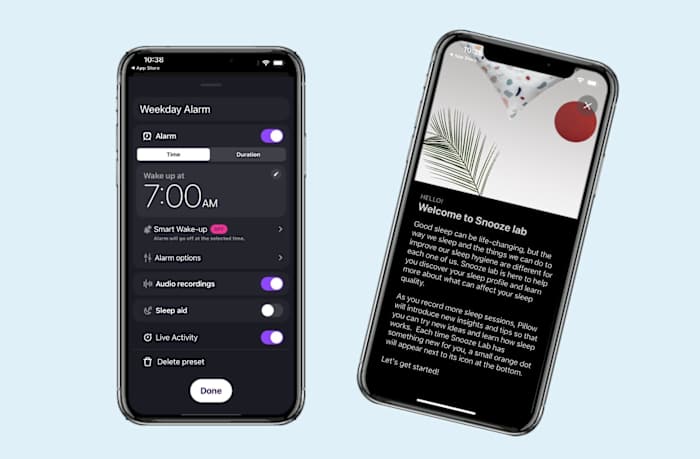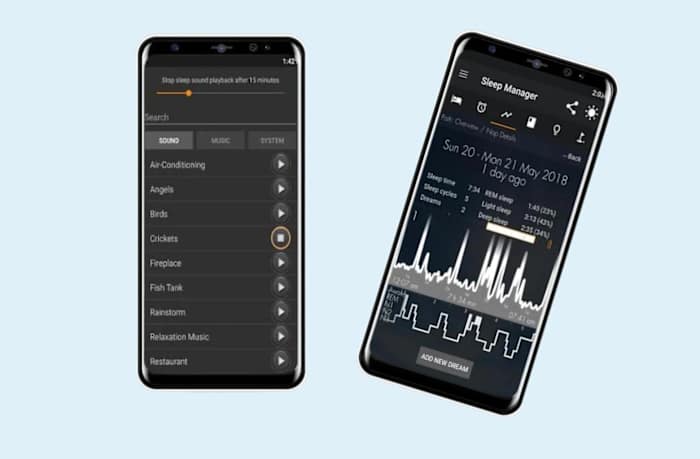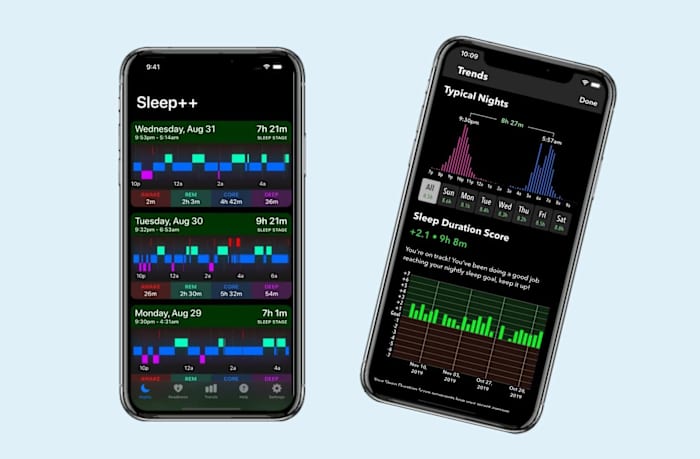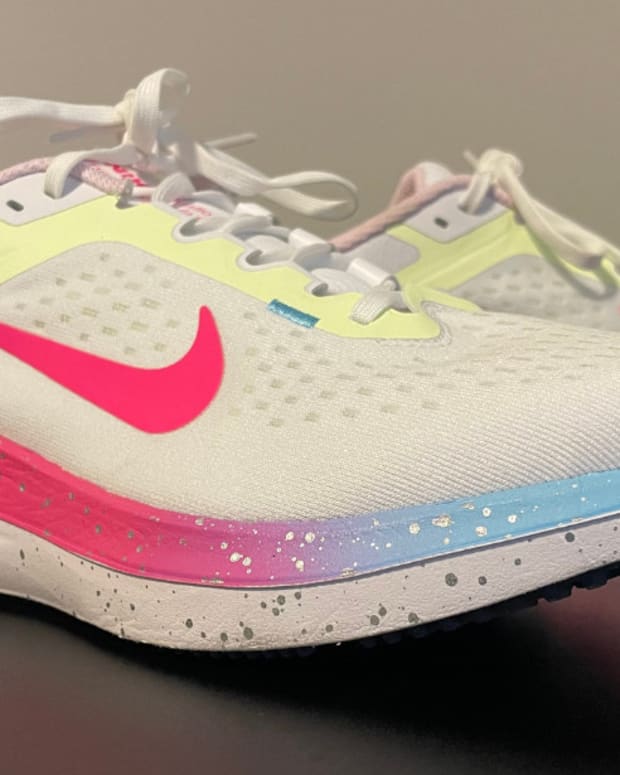The products featured in this article have been independently reviewed. When you buy something through the retail links on this page, we may earn commission at no cost to you, the reader. Sports Illustrated editorial staff are not involved in the creation of this content. Learn more here.
To live well, you must sleep well. It’s quite a conundrum considering how little control we have over the strange coma-like state we’re supposed to drift into every night. But with the help of a wave of health apps that promise to offer key insights into our sleeping habits, we might have more power over our sleep than ever before.
While even the most advanced sleep tracker apps on the market right now do not compare to clinical sleep studies, also called polysomnography (PSG), there are some great advances in at-home sleep assessment. Through data and helpful tips, these apps can actually help you improve the quality of your sleep. Because even with sleep aids and the best melatonin supplements, the key to getting good rest is understanding your patterns and improving your sleep hygiene.
Like other habit tracker apps, these apps will only work if you are a willing participant, so we wanted to round up the ones that people would most want to use. That meant finding the most user-friendly apps, and apps that pair with sleek, wearable tech—like our top pick the Oura Ring App. In this article, we’ll run through these favorites and explain how the apps actually work. This guide will show you the types of sleep-tracking apps available and help you determine which one is best for you.
Our Picks for the Best Sleep Tracking Apps:
- Best Overall Sleep Tracking App: Oura Ring App
- Best Sleep Tracking App for Apple Watch: Pillow
- Easiest Sleep Tracking App to Use: Sleep Cycle
- Best App to Track Sleep Quality: SleepScore
- Best Sleep Tracking App for Android: PrimeNap
- Best Free Sleep Tracking App: Sleep++
Best Overall: Oura Ring App
Specs:
- Free version: No
- Price: $300 for the basic model
- Ratings: 4.6 on the Apple App Store, 4 on Google Play
Key features:
- Exceptionally accurate heart rate and heart rate variability tracking
- Provides actionable steps to improve your sleep quality and health
This nifty titanium ring is one of the best wearables on the market for tracking basic health data. We were impressed that the Oura Ring boasts some of the most accurate sleep tracking capabilities, including precision in terms of heart rate and heart rate variability measurement. Think of this measurement as an at-home EKG. Getting any sort of abnormal reading there could literally save your life. It also gives you a skin temperature reading and some research suggests that it can give you an early warning if you’re about to get sick.
But back to sleep. The Oura Ring App rose to the top of our list because the app is comprehensive. You can check out the amount of time you spent in REM sleep, deep sleep and light sleep. The app will then automatically cross reference this with your activity levels to give you a comprehensive report on how ready your body is to face the day. An in-house study of the most recent algorithm update shows that the ring agrees with polysomnography 79 percent of the time, which is about 5 to 10 percent more accurate than other wearable devices. Note that this study comes from Oura Health, so it is not independently validated.
As an accessory, it’s got a sleek aesthetic. That’s great for the stylish among us, but its small and light package makes it comfortable to wear as you snooze, especially when compared to bulky watches and fitness trackers. At 4 to 6 grams depending on your ring size, you’ll hardly notice you’re wearing such a small but mighty tool for sleep analysis.
What we like:
- App shows the overall status of your body
- Accurate as far as at-home trackers go
- Interesting health data beyond sleep stats
- More in-depth sleep insights than competing apps
What to consider:
- Expensive. Plus, Gen3 ring users pay a monthly $5.99 membership on top of the device price
- It’s a ring—be prepared to lose it if you’re not wearing it constantly
Best App to Track Sleep Quality: SleepScore
Specs:
- Free version: Yes, with in-app purchases for more features
- Price: $59.99 yearly or $9.99 per month
- Ratings: 4.4 on Apple Store, 3.3 on Google Play
Key features:
- Provides accurate and detailed sleep data on the different stages of your slumber
- A gentle smart alarm system that knows the best time in your sleep cycle to wake you
Thanks to years of studies, SleepScore earns the rank as the best app to track the actual quality of your sleep. SleepScore outranks the other apps that also make claims to tell you about the quality of sleep because its data is, for at-home trackers, pretty good.
The SleepScore app uses sonar to measure your sleep, which makes it a more accurate sleep tracking app than those that use movement and sound trackers alone. The sleep app is still a little off sometimes and a 2021 study showed that SleepScore significantly underestimated REM sleep and was only moderately accurate compared to PSG. But keep in mind PSG readings use brainwaves and highly sophisticated tracking in a controlled lab setting, which is not going to happen at home with your iPhone next to your bed. The company founders and engineers are also very transparent about the work they’re doing to improve the science and the limitations of the current algorithms. We look forward to the improved accuracy of each iteration of the app.
SleepScore made up points by providing great tips about how to improve sleep and reach your rest and recovery goals. This feature is only available with the premium subscription, so be prepared to pay if you want the most out of this app. There’s a free version, which is helpful if you just want the basics of your sleep cycle and feel like you can discern what to do with the data alone.
What we like:
- Easy to use and set up
- Helpful tips to help you reach your sleep goals
- Transparency about how the sleep app works
What to consider:
- Subscription required for the best features
Easiest Sleep Tracking App to Use: Sleep Cycle
Specs:
- Free version: No
- Price: $29.99 per year
- Ratings: 4.7 on the Apple App Store and 4.4 on Google Play
Key features:
- Simple user-friendly interface
- Interesting data with audio incorporated into graphics
Setting up Sleep Cycle was so easy that it won points right away. Then after, understanding the app and how to use the sleep monitor was intuitive and glitch-free. The layout of the sleep trend data collected is also impressive and includes a graph that correlates the audio findings to any disruptions in a user’s sleep cycle.
Our main gripe with Sleep Cycle is just how simplistic it is despite charging a fee. It doesn’t offer tips for better sleep and it won’t tell you how long you spent in each sleep cycle. From what we can tell, it relies primarily on sound to track your sleep cycles, which isn’t exactly solid science. There is also a lack of information available to show how exactly the app is working. That said, if you’re someone who suspects snoring, sleep talking or maybe even a loud cat is messing with your sleep, Sleep Cycle will be able to validate whatever hypothesis you have with clean graphs.
What we like:
- Audio overlay shows sound interruption on graph
- Easy to understand and operate
- Reasonable price
What to consider:
- User responsible for turning on app to function
- Lack of sophisticated data
Best Sleep Tracking App for Apple Watch: Pillow
Specs:
- Free version: Yes
- Price: $6.99 per month or $39.99 per year with a 1-week free trial
- Ratings: 4.4 on the Apple App Store
Key features:
- Accurate sleep cycle tracking when paired with Apple Watch
- Wonderful personalization of sleep tips
Pillow is very popular among sleep tracker users because it provides insights in an easily digestible way and then offers specific and individualized advice to help improve your sleep. The app performs best when it’s paired with your Apple Watch. But it can be used in manual mode by placing your phone under your pillow. Using either the watch or your phone, it measures your sleep quality by tracking your movement and noises and categorizing your sleep stages into light, deep or REM sleep.
The information it gives you about how to increase your deep and REM sleep is pretty cool. It will tell you the optimal time for you to go to bed, how many hours of sleep you should be getting and what might be interrupting your sleep. The app will also ask you about your mood upon waking and other subjective data points to learn more about your sleep habits over time.
While the experience using Pillow with an Apple watch was great, we were most concerned about the accuracy of the app in manual mode. Here, there is room for user error as you’re inputting your own sleep and wake times. Plus, it doesn’t make use of Sonar like SleepScore, which makes the tracking moderate at best. Pillow also likes to make a big deal about capturing sleep sounds and categorizing them, which is helpful if you’re wondering if snoring or sleep-talking is something hindering a restful night. But we can’t help but wonder, why not just use your phone’s audio recording device? Overall it’s a great app, especially when used with the Apple Watch.
What we like:
- Advanced personalized insights and tips
- Great user experience and interface
- Breakdown of sleep cycle in easy-to-understand graphs
What to consider:
- Not available on Android
- To use without Apple Watch, you’ll need to put your phone under your pillow
Best Sleep Tracking App for Android: PrimeNap
Specs:
- Free version: Yes
- Price: Free or $3.49
- Ratings: 3.7
Key features:
- Made specifically for Android devices and users
- Offers a dream journal
PrimeNap gets a special shout out because it’s one of the best sleep tracker apps for people using Android operating systems. For a free app, it provides a lot of tools. Like many of the other apps on our list, it measures your sleep quantity and quality, from mid-day naps to overnight slumbers, tracking the different cycles you go through each night.
The accuracy of those cycles is a little dodgy since it relies primarily on movement tracking to analyze sleep patterns. We also wanted to see how it stacks up against PSG metrics but were hard-pressed to find any studies, independent or by PrimeNap itself.
What it lacked in transparency it made up for with cool features, like the sleep debt graph and analysis and the option to use soundscapes to lull you to deep sleep. And who doesn’t like a dream journal?
What we like:
- No subscription required
- Made for Android
- Interesting sleep debt analysis
- Features including dream journal and soundscapes
What to consider:
- Reviewers found the interface confusing and difficult to figure out
- Less accurate than counterparts
Best Free Sleep Tracking App: Sleep++
Specs:
- Free version: Yes
- Price: Free
- Ratings: 4.2
Key features:
- Automatically tracks when wearing an Apple Watch
- Free app
If you’re looking for a free and simple app that will give you a general idea of how well you’re sleeping, then Sleep++ is the one for you. Here’s the deal – the sleep app does not pretend it’s reading your brainwaves or doing anything close to that. And it doesn’t have dream trackers, white noise machines or a smart alarm clock feature. It’s simply going to monitor the duration of your sleep and give you insights into your awake minutes versus those spent at rest.
Apple Watch users don’t have to do anything but download the app to get going. It will automatically track your sleep each night if you’re wearing your device. But for those of us without an Apple Watch, you’ll need to manually input the time you go to bed and the time you wake up.
Overall, it does just what it says it will. If you just need to understand if you’re getting enough hours of sleep per night, Sleep++ works.
What we like:
- Easy to use
- Free
- Offers sleep duration data
What to consider:
- For iOS only
- Very basic information and no extra features
What is a Sleep Tracker App?
A sleep tracker app is an application that monitors and measures essential data points to track the quality of your sleep. Most sleep recorder and tracker apps break down the amount of time you spend in each phase of your sleep cycle, meaning they calculate the minutes or hours you spend in light, deep or REM sleep.
Testing for sleep issues like sleep apnea, narcolepsy or parasomnias is generally done in a lab setting. If you’re having issues with your sleep, doctors will order a polysomnography or sleep study, that records your breathing, brain waves and heart rate as you snooze. Sleep tracker apps seek to help you sleep better by offering similar insights in an at-home setting.
You might be wondering how on Earth would your phone be able to pick up on the delicate changes that indicate shifts in sleep. The answer is that personal sleep tracking is not yet an exact science and your phone is definitely not set up to track your brainwaves. It can, however, track movement, sound and sonar. Still, new algorithms are being invented and tested every day so that sometime in the future, your sleep tracker app can be as reliable as a night at a sleep clinic. Here’s how they work so far:
Movement: You’re probably aware that your phone and, if applicable, wearable device track your every move. The built-in accelerometer can count your steps and track your energy output. Sleep trackers make use of this in a somewhat logical way; if you’re moving, you’re not sleeping. That might make sense in AI land, but we all know that sometimes we shift while we sleep but that doesn’t necessarily mean we’re awake. And, sometimes these accelerometers will translate your time spent binge-watching true crime docs as time sleeping. So the movement tracking in sleep apps has to be paired with other sources to accurately track your slumber.
Sound: The sleep tracker app will listen in as you sleep. If it hears more sound, it assumes you are awake while less sound indicates you are sleeping.
Sonar: The sonar tech in new sleep-tracking apps is probably the most novel and insightful. Your phone will bounce waves off your chest as you breathe to monitor your breath patterns, which change as you go through the various sleep phases. The sleep tracker app will record your breath and, using this information plus the movement and sound data, spit out data that indicates when and how long you were in each cycle of sleep.
Finally, if you are wearing a fitness tracker or smartwatch, the sleep tracker app will have fairly accurate heart rate data to use in its analysis.
How to Use a Sleep Tracker App
Using a sleep tracker app is easy. The first step is to choose the application that is right for you and download it to your device. Each app will have its own set of instructions, but in general, the app will ask you for permission to use your microphone and speakers. (You will likely want to read through the app’s privacy policy since it will be “listening in” as it tracks your sleep.)
Some of the apps will ask you a series of questions or have you start a sleep journal while others work in the background until you open it to access your sleep data. Apps that make use of sonar might require you to position your phone on a nightstand or near your pillow for accurate readings. Those using wearables will need you to, of course, wear the device to bed.
Once you have a few nights of sleep recorded, you can take a look and see if you notice any patterns. The apps we’ve picked have great UX that will take you through the findings and offer advanced insights. Some, like Sleep Cycle, will even give you actionable steps to improve the quality of your sleep.
Benefits of Using a Sleep Tracker App
Doctors, scientists, teachers, our moms – everyone tells us we need a good night’s sleep. If you need another authority figure telling you, the National Institute of Health (NIH) explains that sleep is essential for your brain, mood and overall health. And there is scientific evidence that shows a correlation between poor sleep and obesity, stroke, diminished mental health, dementia and cardiovascular problems.
The interesting thing about sleep is how little attention we give to it despite how important it is to our everyday lives. Sure, we might spend money on decent mattresses (athletes especially should invest in a good mattress), but we almost never think about sleep until it’s a problem. By using sleep tracker apps, we can dive into our sleep states and ensure we are getting enough quality rest to support our daily activities.
The sleep tracker app allows you to examine your unconscious state. Are you getting enough REM and deep sleep? Are you in bed for at least seven hours? Is your sleep restless or sound? The sleep trackers can give you data to monitor this vital aspect of your health.
Now, the data isn’t perfect yet, but that shouldn’t necessarily deter you from using a sleep-tracking app. The information these apps provide gives you a kind of broad strokes interpretation of your sleeping habits. You’ll get a sense of if you’re getting enough sleep and if it’s actually restful. For those of us trying to maintain a healthy weight or the weekend warriors among us needing to track recovery to prevent injury, these stats are super helpful.
Of course, you can’t expect to download an app, look at some metrics and then magically get a better night’s sleep. You have to put in the work and use the data to make personal improvements. A 2022 behavioral study showed that using a sleep tracking app benefited between 30 and 50 percent of participants surveyed. While the research concluded that more analysis and better info within the apps would be beneficial to users, it showed that for those committed to understanding and improving their own sleep cycles, an app is a useful tool.
Precautions
While sleep-tracking apps can give you decent information about your sleeping habits, it cannot replace a sleep study. So if you’re wondering if you have sleep apnea or if you’re struggling with night terrors, sleepwalking or chronic insomnia, skip the download and book an appointment with your primary care physician as a first step. They can refer you to a sleep specialist who can use proven scientific methods to help you gain a better understanding of what’s going on in your body. Don’t mess around with sleep conditions – some of what you’re experiencing may be beyond your control and will not be fixed by a $3 dollar app or $300 wearable device.
How to Choose the Best Sleep Tracker App for You
The rise in sleep tracking app options can make finding the right one for you a challenge. First and foremost, find an app that others find to be accurate. While nothing will be as accurate as a night in a sleep clinic, the best apps will give you a clear picture of your sleep patterns. After that, there are a few additional points to consider.
Data
Before hitting download, think about what you’re looking to solve and why you need your sleep data. Most of these apps will give you a sense of what sleep stages reach in a night, the duration of your sleep, time spent awake and any interruptions you encounter.
From there, you’ll want to determine if you want add-ons. For example:
- If you’re on a journey to find out why you’re tired, you might need an app that will calculate your activity versus recovery time to ensure you are getting enough rest.
- If, for example, you’re an athlete aiming to monitor your recovery, you will want an app that has a wearable device that incorporates heart rate into the findings.
- If you want to find out if you are chatting in your sleep, find an app that uses sound to monitor you.
Ease of Use
Look at other users’ ratings to find out if the app you’re thinking about trying is easy to use and understand. Some sleep tracker apps overcomplicate things that can be simple. The apps on this list are all uncomplicated and boast a good or excellent user experience.
Privacy
Sleep tracker apps will use your microphone to listen in while you’re sleeping. They use this information as a method in determining your sleep phases. When you download the app and enable this setting, you are granting it permission to have ears in your home. Read the privacy disclaimers on any app you are considering.
What to Avoid in a Sleep Tracker App
While the tech in these at-home sleep tracker apps is not yet gold-standard PDG quality, some companies take science more seriously than others. Don’t download an app that is using outdated algorithms or one that’s making false claims.
Next, if you are prone to overanalyzing, overthinking or just plain worrying, skip the apps. One study from 2017 showed that preoccupation with sleep data can worsen sleep or cause insomnia. Visit your doc instead to see if you need to gain insights about your sleeping habits or try a notebook instead of anything too exacting or technological.
Our Methodology: How We Chose the Best Sleep Tracker App
When making our list, we considered three main variables: accuracy, user experience and price. We researched several sleep tracker apps and chose six at varying price points that provided users with good data and that were actually helpful.
Accuracy is important in any health app but especially in something that claims to study such a huge portion of our lives. Sleep is essential to our wellbeing and we deserve apps that offer features based on research and not pseudoscience. We also favored companies that were transparent about their data and limitations and included any studies they or independent researchers performed with the app.
In terms of user experience, we chose apps that would offer a robust overview of sleep in a beautiful and easy-to-use interface. This included accessibility features.
Finally, price is always a top priority. Consumers are bombarded with subscription fees, so we paid attention to the most cost-effective programs that would give users the best bang for their buck.
Sleep Tracking App FAQs
Do sleep tracker apps work?
Sleep tracker apps work but with some limitations. These apps do not measure brain waves or breath rates and are not as accurate as a clinical sleep study.
Can sleep apps detect REM sleep?
Using sonar, sound and/or movement detectors, sleep tracker apps can detect different states of sleep, including REM sleep.
What is the NHS-recommended sleep app?
The NHS recommends Pzizz to help improve sleep. Pzizz uses scientific research to offer users mindfulness exercises, soundscapes and tracking to boost sleep hygiene.
Related Post: The Best Headphones for Sleeping
How do phone sleep apps know when you’re sleeping?
Smartphone sleep tracker apps use the phone’s microphone to detect sounds, an accelerometer to monitor movement and sometimes sonar technology to track your breath. Apps take into account one or all of these data points to analyze your time spent asleep and the various sleep cycles you experience during sleep.
Takeaway: Are Sleep Tracker Apps Worth It?
For healthy humans wondering about their sleeping habits, a sleep tracker app might be more than a bedtime story; In fact, these sleep apps can be a worthy investment. You’ll gain insights into how much energy your body actually has and how much activity it can handle. More importantly, many of these apps offer helpful advice to help you get a good night’s rest. For anyone that’s ever struggled to doze off, this type of information is, in our humble opinion, more valuable than one million sheep.
Prices are accurate and items in stock as of publish time.
